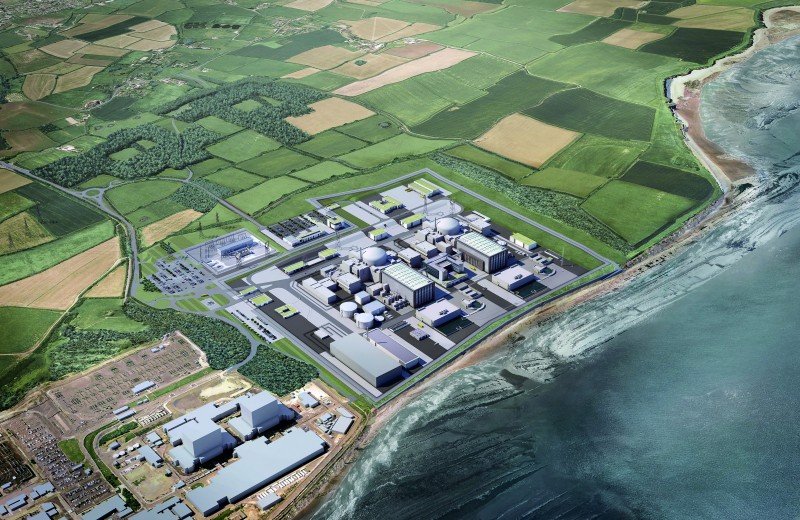
Hinkley Point C – aerial view
With nuclear power playing an increasing role in the UK’s energy supply, Craig Reiersen looks at three essential requirements for nuclear site safety.
The UK government has stated that nuclear power has a role in the country’s future energy supply, alongside other low-carbon sources, and a number of companies have indicated that they wish to install and operate different types of reactor design at sites in England and Wales.
The Office for Nuclear Regulation (ONR) is the country’s principal independent regulatory body for the nuclear industry, regulating safety and security at 37 licensed nuclear sites. This includes the existing fleet of operating reactors, fuel cycle facilities, waste management and decommissioning sites and the defence nuclear sector.
In addition, ONR regulates the transport and safeguarding of nuclear materials and the design and construction of new nuclear facilities. It is a top priority for ONR to ensure that nuclear power stations are designed, constructed and operated safely and securely and we are currently working with reactor designers and potential operators to understand their plans and oversee their activities.
There are three key aspects to ONR’s work on new reactors – generic design assessment; nuclear site licensing; and nuclear reactor construction.
Generic design assessment
Together with the Environment Agency and Natural Resources Wales, we provide a systematic assessment of potential new reactor designs planned for operation in the UK through the generic design assessment (GDA) process.
Through this established process, we work together to ensure that any new nuclear power stations in the UK meet high standards of safety, security, environmental protection and waste management.
The GDA process focuses on the reactor design and does not consider any site specific issues. The regulators undertake a technical assessment of the submissions provided by the design companies and provide advice about any issues they identify, thus allowing issues to be resolved at the design stage, increasing regulatory effectiveness and efficiency.
The process is systematic and contains a number of steps, with the assessment becoming increasingly detailed as the process develops. In 2012, ONR concluded its assessment of the EDF/Areva EPR design and issued a “design acceptance confirmation” which affirms the suitability of the design for construction in this country. ONR’s current assessments include the designs for the Hitachi-GE Advanced Boiling Water Reactor (ABWR) and Westinghouse’s AP1000.
Nuclear site licensing
A nuclear power station cannot be constructed or operated in the UK without ONR granting a nuclear site licence. A site licence puts the licence holder under strict legal obligations and, importantly, gives wider regulatory powers to ONR to ensure the safe construction, commissioning and operation of a nuclear site.
Before we can grant a licence, it needs to be satisfied that the applicant’s choice of site is suitable; that it understands the hazards and risks of the activities that it proposes to carry out; and that it has a suitable schedule of safety submissions leading through to a safety case which justifies the start of construction.
ONR places particular emphasis on the need to gain confidence that the applicant has the right organisational capability to lead and manage safety effectively. This means that we must be satisfied with the applicant’s governance arrangements, resources, competencies and management processes, among other things, before it can consider granting a licence.
In December 2012, ONR granted a nuclear site licence to NNB GenCo Ltd to construct and operate an EPR at Hinkley Point in Somerset. At present, ONR is engaged with Horizon Nuclear Power Ltd, which intends to build two UK ABWR reactors at Wylfa Newydd on Anglesey, and NuGen Ltd who intend to build three AP1000 reactors at Moorside in Cumbria. ONR anticipates receiving licence applications from both Horizon and NuGen in 2016 and, typically, it takes ONR up to two years to complete a robust and comprehensive assessment of the application.
Nuclear reactor construction
The granting of a nuclear site licence is a significant step but does not allow the licensee to start construction of nuclear safety-related plant. Commencing construction of a reactor requires a further, separate, permission from ONR.
In addition to monitoring compliance with conditions made under the licence, ONR will provide continuing regulatory oversight of the licensee’s safety case and its organisational capability to ensure that all stages of construction and commissioning are planned and delivered safely and securely. We will then continue on-going regulation when the reactor is operating safely.
At present ONR is regulating NNB GenCo Ltd as they prepare to commence safety-related construction at Hinkley Point C.
We are committed to openness and transparency and publish regular progress reports on all of our work relating to nuclear new build.
To find out more about ONR’s work to secure the safe design, construction and operation of the next generation of nuclear power stations in England and Wales, visit http://www.onr.org.uk/civil-nuclear-reactors/index.htm
Craig Reiersen is head of New Reactor Licensing at the Office for Nuclear Regulation
The Safety Conversation Podcast: Listen now!
The Safety Conversation with SHP (previously the Safety and Health Podcast) aims to bring you the latest news, insights and legislation updates in the form of interviews, discussions and panel debates from leading figures within the profession.
Find us on Apple Podcasts, Spotify and Google Podcasts, subscribe and join the conversation today!


